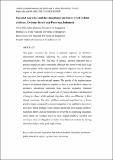Files in this item
Parental migration and the educational enrolment of left-behind children : evidence from rural Ponorogo, Indonesia
Item metadata
| dc.contributor.author | Arlini, Silvia Mila | |
| dc.contributor.author | Yeoh, Brenda S. A. | |
| dc.contributor.author | Khoo, Choon Yen | |
| dc.contributor.author | Graham, Elspeth | |
| dc.date.accessioned | 2020-11-20T00:38:25Z | |
| dc.date.available | 2020-11-20T00:38:25Z | |
| dc.date.issued | 2019-05-20 | |
| dc.identifier | 259017632 | |
| dc.identifier | fe3a3cb7-4384-4b9f-b2c4-a5565dbd8bf9 | |
| dc.identifier | 85066104220 | |
| dc.identifier | 000468665600001 | |
| dc.identifier.citation | Arlini , S M , Yeoh , B S A , Khoo , C Y & Graham , E 2019 , ' Parental migration and the educational enrolment of left-behind children : evidence from rural Ponorogo, Indonesia ' , Asian Population Studies , vol. Latest Articles . https://doi.org/10.1080/17441730.2019.1609294 | en |
| dc.identifier.issn | 1744-1730 | |
| dc.identifier.uri | https://hdl.handle.net/10023/21019 | |
| dc.description | This work has been funded by UK aid from the UK government through the Migrating out of Poverty (MOOP) Research Programme Consortium; however the views expressed do not necessarily reflect the UK government’s official policies. | en |
| dc.description.abstract | This paper examines the effects of parental migration on children’s educational enrolment following the recent reforms in Indonesian educational policy. We find that, in general, parental migration has a positive impact on school enrolment, although this varies by the child’s age and the gender of the migrant parent. Parental migration has an adverse impact on the school enrolment of younger children who are eligible for free education, but a positive impact on older children who are no longer able to access state educational support. The gender of the migrant parent matters, as paternal migration appears to have a more positive impact on children’s educational enrolment than maternal migration. Maternal migration is associated with a reduction of younger children’s likelihood of a being in school, while paternal migration makes no difference to their school enrolment. For older children, maternal migration has a lower positive impact compared to paternal migration. Our qualitative interviews also show mixed findings: some children appreciate their migrant mothers’ migration efforts and are motivated to persevere in continuing education, while others are weighed down by their migrant mothers’ sacrifice and develop a sense of obligation to reduce their financial burdens by leaving education early to enter paid employment. | |
| dc.format.extent | 636346 | |
| dc.language.iso | eng | |
| dc.relation.ispartof | Asian Population Studies | en |
| dc.subject | Parental migration | en |
| dc.subject | Left-behind children | en |
| dc.subject | Education enrolment | en |
| dc.subject | Public education support | en |
| dc.subject | Gender roles | en |
| dc.subject | Indonesia | en |
| dc.subject | GF Human ecology. Anthropogeography | en |
| dc.subject | HM Sociology | en |
| dc.subject | HQ The family. Marriage. Woman | en |
| dc.subject | NDAS | en |
| dc.subject | SDG 4 - Quality Education | en |
| dc.subject.lcc | GF | en |
| dc.subject.lcc | HM | en |
| dc.subject.lcc | HQ | en |
| dc.title | Parental migration and the educational enrolment of left-behind children : evidence from rural Ponorogo, Indonesia | en |
| dc.type | Journal article | en |
| dc.contributor.institution | University of St Andrews. School of Geography & Sustainable Development | en |
| dc.identifier.doi | https://doi.org/10.1080/17441730.2019.1609294 | |
| dc.description.status | Peer reviewed | en |
| dc.date.embargoedUntil | 2020-11-20 |
This item appears in the following Collection(s)
Items in the St Andrews Research Repository are protected by copyright, with all rights reserved, unless otherwise indicated.

